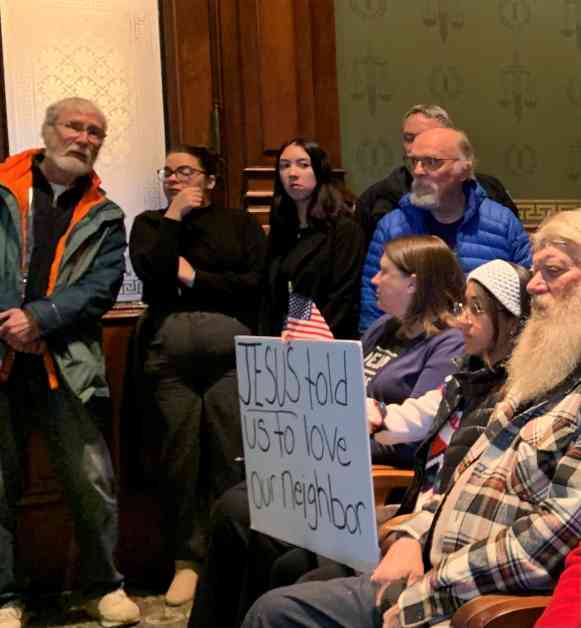Iowa Bill Calls for Law Enforcement Cooperation with Federal Immigration Orders
A bill currently under consideration in the Iowa House has sparked heated debates and divided opinions among lawmakers, lobbyists, and community members. The proposed legislation would mandate Iowa police and sheriff’s departments to comply with any federal orders to detain individuals suspected of being in the country illegally. This contentious issue has drawn strong reactions from various stakeholders, each offering their unique perspectives on the potential implications of such a law.
Concerns Over Budget and Responsibilities
During a recent hearing on the bill, Mike Tupper, a lobbyist representing the Iowa Police Chiefs Association and retired Marshalltown police chief, expressed reservations about the proposed legislation. Tupper highlighted the financial constraints and staffing limitations faced by local law enforcement agencies, emphasizing that additional responsibilities related to immigration enforcement could strain their already limited resources. He argued that while local officers collaborate with federal partners on public safety matters, immigration enforcement should not fall under their purview. Tupper raised concerns about the potential negative impact on community relations and overall public safety if local law enforcement were to become actively involved in immigration-related activities.
John Noble, a concerned citizen from Des Moines, echoed Tupper’s sentiments, criticizing the bill as a distraction from more pressing issues facing Iowa, such as healthcare, education, and public welfare. He emphasized the importance of addressing core societal challenges rather than focusing on divisive legislation that could create fear and animosity towards immigrant communities. Noble’s remarks underscored the broader societal implications of the proposed bill, urging policymakers to prioritize the well-being of all residents, regardless of their immigration status.
Community Backlash and Political Responses
Vanessa Marcano-Kelly, board chair of the Iowa Movement for Migrant Justice, did not mince words in her criticism of the bill’s sponsors and supporters. She condemned Representatives Holt and Wheeler, labeling them as extremists promoting xenophobic and racist policies that run counter to Iowa’s values of inclusivity and compassion. Marcano-Kelly’s impassioned plea highlighted the deeply personal and emotional stakes involved in the immigration debate, urging lawmakers to consider the human impact of their decisions on vulnerable immigrant populations. Her remarks resonated with many advocacy groups and community members who view the bill as a threat to Iowa’s tradition of welcoming immigrants and valuing diversity.
In response to the mounting backlash, Representative Steven Holt, a Republican from Denison and one of the bill’s proponents, defended the legislation by emphasizing the distinction between legal and illegal immigration. Holt underscored the importance of upholding the rule of law and ensuring public safety by addressing criminal elements among the undocumented population. He argued that collaboration between local, state, and federal authorities was essential to removing dangerous individuals from communities and safeguarding the well-being of all residents, regardless of their immigration status. Holt’s remarks reflected the complex interplay between security concerns and humanitarian considerations that underpin the immigration enforcement debate.
Republican Representative Skyler Wheeler shared a personal anecdote to underscore the urgency of the bill, recounting a recent incident in his hometown of Hull where an illegal immigrant allegedly stabbed two individuals. Wheeler framed the issue as a matter of citizen safety, asserting that those who enter the country unlawfully are criminals deserving of enforcement actions. His impassioned plea to prioritize the protection of citizens resonated with constituents who prioritize security and law enforcement as key government functions. Wheeler’s narrative added a humanizing dimension to the policy debate, illustrating the real-world consequences of unauthorized immigration and the need for robust enforcement measures.
The bill in question would compel Iowa law enforcement agencies to sign a memorandum committing to collaborate with federal authorities on enforcing immigration laws. As of Wednesday night, the ACLU of Iowa reported that 157 jurisdictions across the United States had already signed similar agreements, signaling a growing trend towards local involvement in immigration enforcement efforts. The evolving landscape of immigration policy and enforcement practices underscores the complex interplay between federal mandates and local priorities, raising questions about the proper role of law enforcement in addressing immigration-related issues.
The bill’s proponents and opponents will continue to engage in spirited debates, reflecting the broader national discourse on immigration policy and enforcement. As Iowa legislators navigate these contentious issues, the voices of community members, advocacy groups, and law enforcement officials will play a critical role in shaping the outcome of this proposed legislation. The future of immigration enforcement in Iowa hinges on the delicate balance between security imperatives and humanitarian considerations, highlighting the nuanced complexities of this multifaceted issue.









